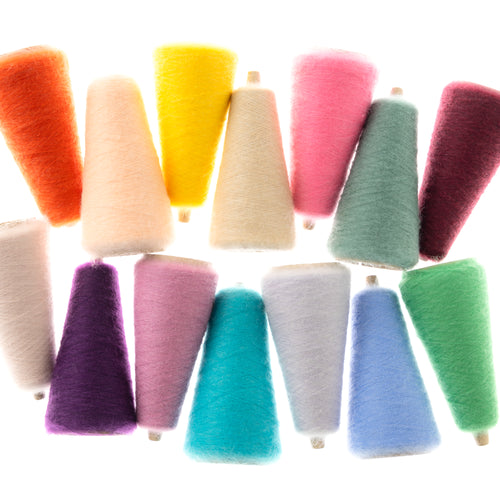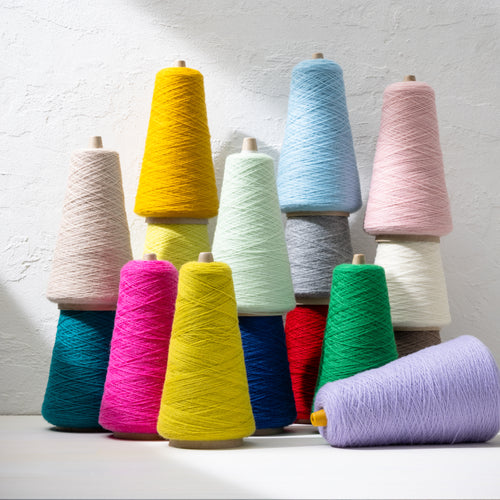












10/2 BANANA CLOTH / Nanohana (tea)
10/2 BANANA CLOTH
Naturally dyed banana stem cotton
Why not try knitting with unusual materials?
BANANA CLOTH is made from threads made from banana stems that would otherwise be discarded.
A textile manufacturer based in Nishiwaki City, Hyogo Prefecture, that has been producing Banshu weaving for 80 years.
Herb Fabric, a dyeing technology developed by Toban Senko Co., Ltd.,
We had it dyed in ITORICOT's original colors!
This time I dyed it with tea!
Green tea has antibacterial properties, making it the perfect spring/summer item.
The fiber is extracted from the huge amount of banana stems that are discarded every year, amounting to 1 billion tons.
This yarn is made from a cotton blend.
Bananas are attracting attention as the third fiber after cotton and hemp.
It will also create new jobs for farmers.
It is not only environmentally friendly but also people-friendly.
Herb Fabric
Fabric that blends gently with nature
Natural dyes with beautiful colors extracted from the flowers, leaves, bark, and fruits of plants.
This is a hybrid dyeing method that combines environmentally friendly dyes .
Rather than dyeing the yarn all at once, it is dyed in three steps to allow the plant dye to settle at the end.
The natural dyeing process is very careful and time-consuming, and the colors do not fade.
The simple, rich colors make you feel the power of nature up close.
tea
Contains natural green tea extract and catechin
Tea catechins are said to have antibacterial properties and to have deodorizing and anti-odor properties (such as preventing putrid odors and ammonia odors).
Product Overview
Product name: 10/2 BANANA CLOTH
Composition: 70% cotton / 30% banana fiber
Thickness: Extra thin
Knitting needle size: 0 to 2
Crochet hook size: lace needle ~ 2/0
Approximate length: 100g = approx. 850m
*As this product is dyed with natural dyes, there may be some color unevenness.
※part There may be some loose hair from the original yarn attached to the yarn.
Pickup available at ITORICOT STORE!
Usually ready in 2-4 days

10/2 BANANA CLOTH / Nanohana (tea)
100g
浅草橋1-9-12
111-0053
東京都 台東区 浅草橋1-9-12
浅草橋駅前ビル 3F
Japan
Shipping charges
|
egion |
Total weight (product + packaging materials, etc.) |
|||
|
Under2.5 kg |
Under5.0 kg |
Under10.0 kg |
Under15.0 kg |
|
|
Asia |
¥3,000 |
¥4,000 |
¥10,000 |
¥13,000 |
|
Oceania |
¥4,000 |
¥5,000 |
¥15,000 |
¥20,000 |
|
North America |
¥5,000 |
¥6,000 |
¥20,000 |
¥25,000 |
|
Europe |
¥6,000 |
¥7,000 |
¥25,000 |
¥30,000 |
*If you wish to order more than the weight listed above, please contact us below.
store@itoricot.com
Store Pickup
We will prepare your order within 5 store business days after payment is confirmed (usually 2-4 days).
*The above estimate may vary depending on order status, holidays, etc.
*Orders placed before or after winter holidays will take longer than usual.
We will contact you by e-mail when your order is ready.
When you pick up your order, please tell the store staff your order number and name. Paper bags are available for a fee, so we would appreciate it if you could bring your own handbag.
In addition, as a general rule, only those who can pick up your order within one week, or those who plan to come to the store even if it is far away, can pick up your order at the store.
In the unlikely event that we do not hear from you within a week, your order will be automatically cancelled.
About Banana Cloth®
Bananas are attracting attention as the third fiber after cotton and hemp. They can also create new jobs for farmers.
It is not only environmentally friendly, but also people-friendly.
Shortly after bananas are harvested, new shoots begin to grow between the remaining stalks, and the bananas will bear fruit again in 3 to 6 months. In order to produce tasty bananas, farmers cut down the stalks after harvesting, leaving only the new shoots. These cut-down stalks are then discarded, and the amount of banana stalks discarded in 129 countries and regions around the world amounts to approximately 1 billion tons per year.
From banana stalks discarded in banana fields, 500 to 750 grams of fiber can be extracted from each stalk (approximately 25 kg). In other words, if we can utilize the stalks of bananas grown for food, there is no need to set up new fields and use water, pesticides, and energy to grow them just for the purpose of extracting fiber. By extracting natural fiber from something that was previously just discarded,
Making fabric from recycled materials can make a significant contribution to the realization of a circular society.
About Herb Fabric
This is a hybrid dyeing method that combines natural dyes with beautiful colors extracted from the flowers, leaves, bark, and fruits of plants with environmentally friendly dyes.
Rather than dyeing the yarn all at once, it is dyed in three steps to allow the plant dye to settle at the end.
The natural dyeing process is very careful and time-consuming, and the colors do not fade.
The simple, rich colors make you feel the power of nature up close.
This one is dyed with tea.
Contains natural green tea extract and catechin
Tea catechins are said to have antibacterial properties and to have deodorizing and anti-odor properties (such as preventing putrid odors and ammonia odors).
Choose options













Recommended needle size from the number
| Thickness Name | Number | Length (m) | Needle size | mm | Crochet hook size |
|---|---|---|---|---|---|
| Super Thick | Less than 1/1 | Under 100 | Size 7 and up | 0 or more | 10/0 or higher |
| Extra Thick | 1/1-1/2 | 100–200 | Size 10 to 15 | 5.1 - 6.6 | 8/0 - 10/0 |
| Average | 1/2 to 1/3 | 200–300 | Size 7 to 10 | 4.2 - 5.1 | 5/0 - 7/0 |
| Gota | 1/2.5 to 1/4 | 250-400 | Size 4 to 7 | 3.3 - 4.2 | 4/0 - 5/0 |
| Medium Fine | 1/3.5 to 1/5 | 350–500 | No. 2 to No. 4 | 2.7 - 3.3 | 2/0 - 4/0 |
| Combined | 1/4.8 to 1/8 | 480–800 | No. 1 to No. 3 | 2.4 - 3.0 | 1/0 - 3/0 |
| Ultra-fine | 1/8 - 1/12 | 800~1200 | Size 0 to 2 | 2.1 - 2.7 | Lace needles ~2/0 |
| Ultra-fine | 1/13 or more | Under 1300 | No. 0 | 2.1 or less | Lace Needles |
The key to knitting with industrial yarns!
The second stitch is sweeter! ...Knit loose and fluffy!
Industrial yarns are waxed to make them easier to knit with machines, and they are designed to be washed at the end of the process, so they may have oil or solvents on them.
By washing at the appropriate temperature, dirt is removed and the fibers become fluffy, so the key is to knit a bit loosely (softly).
Be sure to knit a swatch for testing!
Since wool and similar fibers tend to shrink, it's important to knit a swatch and calculate the shrinkage rate.
For items with longer fibers, gently pressing them while washing will enhance the texture.
How to wash industrial yarns at home
Iron
First, the finishing iron and steam are applied to the stitch.
Pre-washing
Soak in hot water (no detergent) for about 15 minutes at 40°C or less
Washing
(detergent wash, neutral detergent Emaar, etc.) Wash as desired, or if you want to fluff out the yarn, wash it with a leftover cloth or other material and rub it to make it fluffier.
Rinsing
Change the hot water and rinse until the water is clean.
Finishing touches
Use fabric softener if desired. Use of fabric softener will further improve the texture.
Dehydration
If using a washing machine, place in a net for 30 seconds to 1 minute. Light towel drying is also acceptable.
Dryness
We recommend drying flat in the shade.
Steam iron
Organize shapes and stitch nicely.






![[New color!] 10/2 BANANA CLOTH 10g small roll - various colors](http://itoricot.com/cdn/shop/files/DSC09402_d06f3941-4b29-4123-bdb6-81316c7e75c4.jpg?v=1722657191&width=500)

